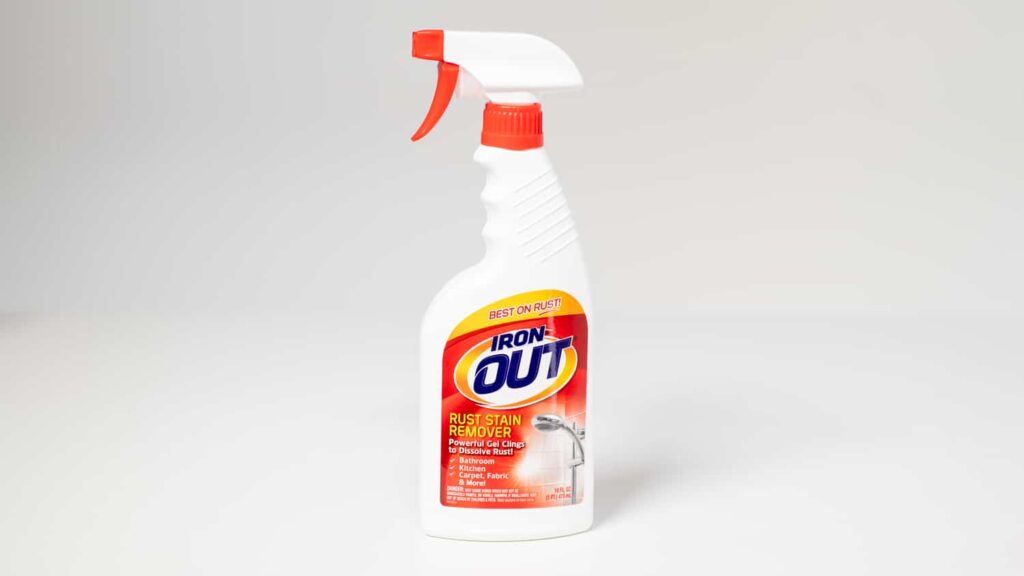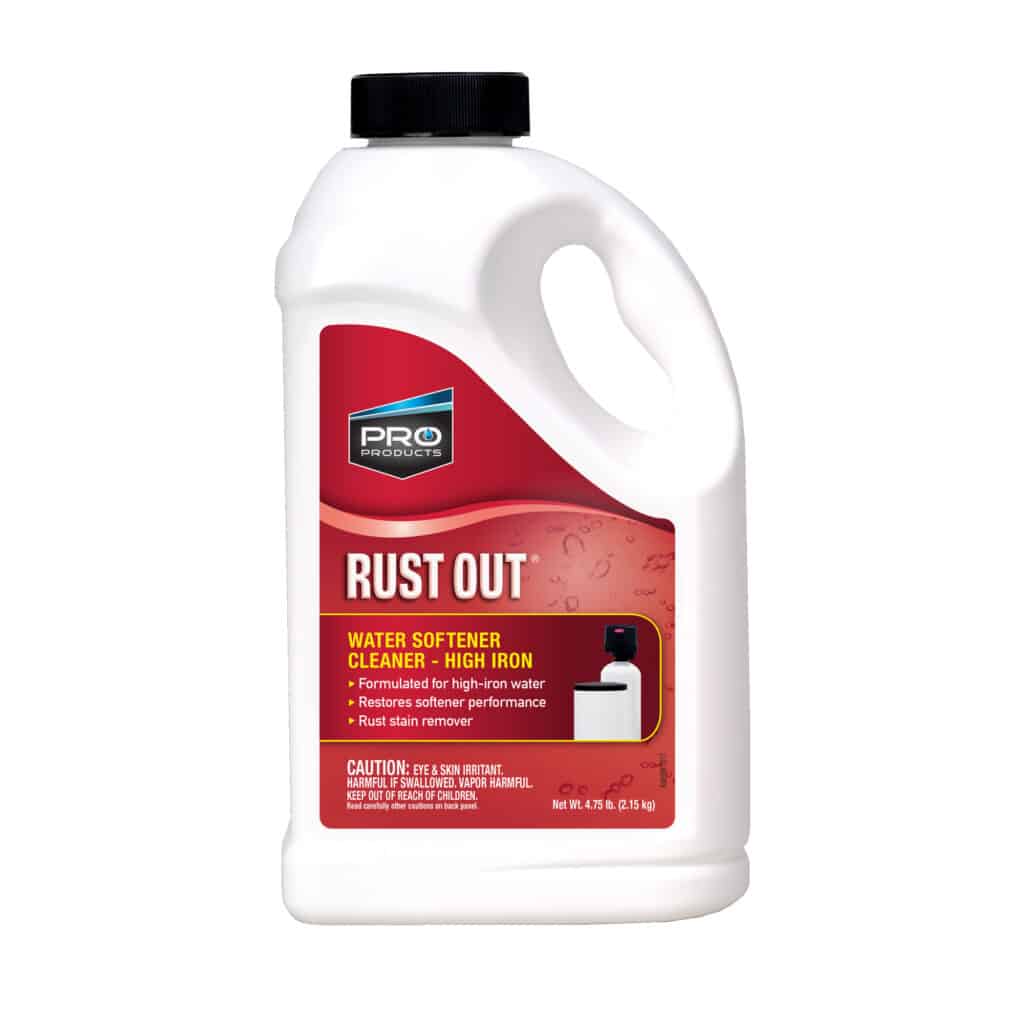Wherever there’s water, there’s the possibility of rust, and that includes water softeners.
Rust oxidizes metal and causes it to become more brittle. If left unattended, it can cause damage to your water softener and maybe even lead to the tank itself breaking.
Luckily, Iron Out is a simple and effective method for getting rid of this buildup.

Does Iron Out Really Work?
According to both the company and its satisfied customers – yes.
Iron Out contains chemicals that essentially dislodge the rust from surfaces. This means that you don’t need to even scrub anything since the product does all of the heavy lifting for you. All you need to do is rinse the surface that you covered in Iron Out, and you’re done.
Of course, when it comes to water softeners, the procedure is a bit more complicated. Since the rust stains are likely inside the tank, getting to them will require a bit of preparation.
How to Use Iron Out in a Water Softener
If you’re trying to get stains out of your water softener, then you’ll need to get the Iron Out powder since it’s the one that’s designed to handle these sorts of jobs.
Before you use Iron Out on your water softener, you’ll need to get a measuring cup, an empty bucket, and half a gallon of water.
Additionally, we’d also recommend getting a mask or at least a handkerchief that you can tie around your mouth and nose. The powder will rise into the air as soon as you pour it, and you don’t want to be breathing in cleaning chemicals.
At the very least, make sure that your face is as far away from the powder as possible, and if you can’t find anything to cover your face with, then just hold your breath while pouring the powder out.
Now that the safety precautions are out of the way, we can get started.
Preparations
The first thing to do is pour half a gallon of water into the empty bucket. The water itself doesn’t need to be sterilized, and you can simply use the softened tap water you get from your water softener.
The next thing is to pour out enough Iron Out powder to fill a standard cup. This is where the powder will rise into the air, so be careful.
If you’re unsure of what “a standard cup” is, then we’d suggest using a measuring cup in order to get the measurements right.
Please keep in mind that you shouldn’t use the measuring cup from your kitchen since these cleaning chemicals have a knack for sticking to things, and they’re incredibly difficult to wash out. Instead, we’d recommend buying a measuring cup specifically for this purpose.
Once you have the bucket of water and the cup full of powder ready, pour the cup into the bucket. The powder will rise into the air again, so try to hold your breath while you pour it into the bucket.
After the powder has settled, use something to stir the water so that the powder is better integrated. 10 or 15 seconds of stirring should be enough to combine the powder with the water.
Introducing the powder into the system
When it comes to water softeners, the iron and rust stains we’re trying to remove form at the bottom of the resin tank. However, we can’t open the resin tank itself, so we’ll get the Iron Out into the system through the brine tank instead.
Once you open the brine tank, you’ll be able to see a cylinder sticking out from the salt. This is also called the brine well, and it’s where the salt and water combine to create the mixture that goes into the resin tank in order to start the regeneration process.
The top of the brine well has a cap that can be opened. Once it’s open, pour the Iron Out mixture from the bucket into the well, and put the cap back on the well and the lid back on the brine tank.
Once the mixture is in the tank, press the regeneration button in order to start the process manually. The system will introduce the Iron Out into the resin tank, and it’ll flush it out automatically with the wastewater.
Can You Put Iron Out in a Well?
Definitely not. If you look at the FAQ section of the brand’s product page, you’ll see that the company has responded to this question with: “Iron OUT is not recommended for use in a well. Please contact a well driller to inquire about well maintenance”.
While the brand doesn’t disclose why, we can guess that the reason why Iron Out can’t be used in well water is that the reservoir can’t be flushed out.
Water softeners rinse out the resin tank and remove both the brine and the Iron Out powder when they purge the wastewater. When it comes to wells since the powder will need to be poured directly into the reservoir, the cleaning chemicals will taint the water, and they’ll linger for a long period of time before they dissipate.
We’d suggest taking the advice of the company and seeking help from a professional if you have an issue with rust in your well.
Rust Out vs. Iron Out

Comparing similar products is always tough, mostly because a lot of the time, there’s no noticeable difference. This applies to Rust Out and Iron Out.
Both products are roughly the same price, and they’re designed to accomplish the same purpose. Both companies obviously claim that their product is the best on the market, and while reviews claim that both are effective rust removers, it’s nearly impossible to determine whether one has an edge over the other.
Rust Out can be purchased in larger quantities since it comes in 1 lb, 4 lb, and 50 lb containers. The price increases with each container size, but a lot of people like the idea of buying a cleaning product in bulk and not having to worry about running out for a long time.
On the other hand, While Rust Out is specifically geared toward water softener cleaning, Iron Out has a larger selection of products that can be used on multiple surfaces around your home.
At the end of the day, both of these products are an excellent choice for removing rust stains, so you can’t go wrong regardless of which one you pick.
Best Iron Out Alternatives
If you can’t get any Iron Out in your local shops, or if they’re out of stock, then there are several alternatives available to you.
We’ve already mentioned Rust Out and how it’s a good alternative, but you might also like to try Pro Res Care.
This product helps prevent rust buildup in the resin tank while also cleaning out fouled resin and ensuring that it doesn’t lose its capacity for ion exchange.